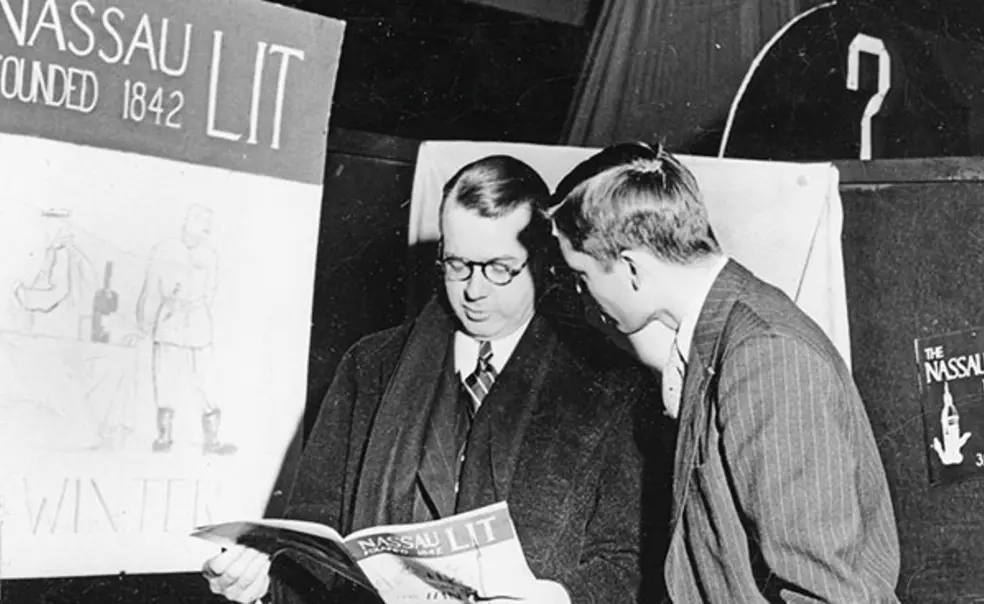In the fall of 1958, Princeton’s aura of excellence lost some of its luster. One salvo came from John Davies ’41, editor of PAW, who decried the state of undergraduate writing in a note accompanying a published lecture by Willard Thorp *26, chair of the English department.
According to Davies, “a surprisingly large proportion of each freshman class are what might be called ‘demi-literate’: They can read but they cannot write. That is, if a substantial number of the previous generation of Princetonians made no pretense to learning, at least they were able to present their small stock of erudition with reasonable clarity and a modicum of grace, whereas many of this new breed are unable to express their presumably deep thoughts in any very comprehensible form.”
Thorp, speaking with the authority of long experience, pulled no punches either, lamenting the rise of “No-English” and indicting the corrupters of student prose: bloated “officialese”; the “hot-rod style” of popular magazines such as Time, Look, and Life; the ubiquitous hyperbole of “ad-men”; and his fellow scholars’ use of specialized vocabularies, substituting impenetrable jargon for a common language.
A student rejoinder was inevitable, and it took the form of a trenchant editorial in the Oct. 1 edition of The Daily Princetonian. If Thorp had rooted his critique in the character of American communication, the Prince took the University itself to task.
Acknowledging the importance of junior papers and senior theses, the editors asserted “there is little stress on writing at Princeton” and “the writing which counts ... is exam-book writing.” The University, they argued, should “take some pains to see that Johnny is told how to write; that he is made to practice writing over and over again; and it should tell Johnny that writing means something here,” not least by increasing the number of and weight attached to papers.
The discontents of 1958 would find their ultimate affirmation in the establishment of the Princeton Writing Program in 2001.
John S. Weeren is founding director of Princeton Writes and a former assistant University archivist.












3 Responses
Jan Andrew Buck ’67
8 Years AgoA Professor’s Unforgettable Lessons: ‘You Can’t Write Worth a Damn’
In response to the article titled “Why Johnny Can’t Write” (That Was Then, Oct. 4), I offer this story from the mid-’60s.
Back then the grading system was 1 (high) to 7 (low). The undergraduate student body consisted of a lot of preppies and highly accomplished kids from high-impact public schools. The professors, knowing that all the kids were smart, having a lot of other things to do like publishing, and not having time to deal with any controversy, were pretty easy. Junior-paper advisers, for example, rather than create a fuss, would give all their advisees a 2 on their first junior papers. No issues, no interruption in their own authorship.
With one exception.
Save one.
Having received a 3-something on my first JP, I went to Kelley and said I’d like to give it a try. True to his word, he taught me how to properly structure a sentence, then how paragraphs could flow like nectar. Critically important, Kelley taught, was how and where to place the proper emphasis. And he was a stickler for proper diction. “There is a better word for the idea you are trying to connote. Find it.” A paperback thesaurus was an inexpensive commodity in those days. I still have mine, though the pages are yellowed and crumbling. I still house it in my holster, rather than an iPhone. Professor Kelley taught me how to write and, importantly, how to communicate. His lessons have been a formative factor in my life, and I will love that old bastard for it till my dying day.
I recently had occasion to attend a presentation by the Foundation Academies, a charter school for the inner-city kids in Trenton. One of the presenters was an enthusiastic young guy who teaches writing to these challenged kids. His words resonated with Maurice Kelley’s lessons. So do not be surprised if one day you see a Trenton kid leave his Newton High School competition and others in the dust.
I write books now. And, by the way, I got a 1 on my senior thesis. Thank you, Professor Maurice Kelley.
Photo: Sept. 9, 1951 Princeton Alumni Weekly
Norman Ravitch *62
8 Years AgoThe best way to learn how to...
The best way to learn how to write is to have read extensively. Many problems in spelling for example can be solved when with reading experience you look at a word you have spelled and see that it cannot or might be correct. Most of my spelling problems, not all of course, have been solved simply by writing the word out and then looking at it. If it is spelled incorrectly I usually see that because it is unfamiliar looking.
This is just one example. Our youth, indeed their parents, do not read. That in my unprofessional view is why they cannot write effectively or even correctly. The domination of electronic devices, television, games, etc. only contributes to the problem. And of course it also leads to speaking poorly -- without full correct sentences. Literacy begins with illiteracy and lasts a lifetime.
George R. Packard ’54
8 Years AgoTargeting Illiteracy
It is clear from the haughty piece by John Weeren (That Was Then, Oct. 4) why Johnny can’t write. The example of illiteracy offered in the quote from John Davies ’41 is in itself illiterate! “... a surprisingly large proportion of each class are what might be called ‘demi-literate’ ... .” Please: Proportion is singular. Get it?